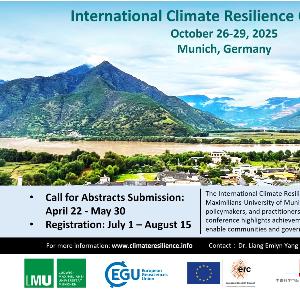Munich Climate Resilience Initiative (MCRI)
31 Oct 2025
Adopted at the Closing Plenary of the International Climate Resilience Conference (iCARE 2025), Munich, 29 October 2025
31 Oct 2025
Adopted at the Closing Plenary of the International Climate Resilience Conference (iCARE 2025), Munich, 29 October 2025

Preamble
Climate change poses unprecedented challenges to societies, economies, and ecosystems across the world. While the scientific community has made remarkable progress in understanding risks, vulnerabilities, and impacts, the global response still falls short of enabling societies to adapt, transform, and thrive amid climatic emergency and uncertainty. Building resilience has become an imperative for sustainable and equitable development.
The International Climate Resilience Conference (iCARE 2025), held in Munich from 26–29 October 2025, gathered leading researchers, policymakers, practitioners, and community representatives to exchange knowledge and experience across 17 thematic sessions and over 200 presentations. Participants shared a clear message: advancing climate resilience requires robust collaboration among scientists, policymakers, and practitioners across disciplines, sectors, and regions.
The Munich Climate Resilience Initiative (MCRI) arises from this shared commitment to promote resilience thinking in research, practice, and policy.
1. Rethinking Climate Resilience
Resilience is not merely about resistance or recovery but about adaptation, learning, and transformation, which together form the foundation for a better tomorrow. It connects environmental sustainability, ecological integrity, social equity, economic stability, cultural heritage safeguarding and institutional flexibility.
The MCRI calls for resilience-centered approaches, which celebrate progress, creativity, and the capacity for renewal and transformation, in addition to the risk-centered narratives, which emphasize vulnerability and loss. Resilience must also be guided by principles of justice and inclusion—ensuring that vulnerable populations are empowered rather than left behind in adaptation and transition processes.
2. Advancing Knowledge and Innovation
Scientific understanding of climate resilience remains fragmented. The MCRI promotes integrated, transdisciplinary, and co-creative research that bridges science, policy, and practice. It encourages:
The Initiative supports the creation of a Global Network for Climate Resilience Studies to enhance data sharing, joint research, exchange among institutions worldwide, and guide science-based policy making.
3. Strengthening Policy and Governance
Resilience must be embedded in international, national, regional, and local governance frameworks. The MCRI calls for:
The MCRI further recommends the use of Resilience Impact Assessments in major infrastructure and policy initiatives to align development with long-term sustainability goals.
4. Mobilizing Partnerships and Collaboration
Achieving climate resilience demands partnerships beyond academia. The MCRI calls for partnerships and collaboration among governments, research institutions, businesses, and civil society to:
Through these partnerships, the MCRI seeks to foster a global community dedicated to transformative, inclusive, and sustainable resilience.
5. Call to Action
The participants of iCARE 2025 commit to:
Resilience is a continuous process of learning and transformation—an essential pathway toward a sustainable and equitable future. The Munich Climate Resilience Initiative invites all scientists, policymakers, and practitioners to join this collective effort to strengthen climate resilience for people and the planet.
Adopted in Munich, Germany, on 29 October 2025
By the participants of the International Climate Resilience Conference (iCARE 2025), hosted by Ludwig-Maximilians-Universität München (LMU Munich) and international partners.